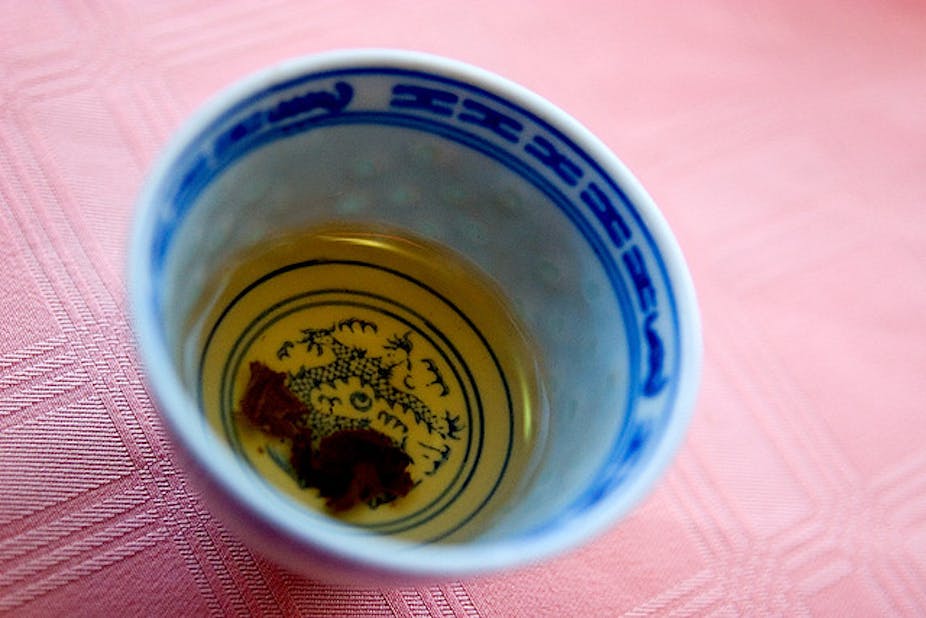Anyone care for a cup of Methomyl? A recent investigation by Greenpeace East Asia has uncovered a catalog of banned and highly dangerous pesticides in Lipton tea products sold on Beijing supermarket shelves.
Random packets of Lipton tea products, including black, green, oolong and jasmine tea, were sent for independent laboratory analysis. Each sample was contaminated by pesticides – green, oolong and jasmine tea each contained nine different kinds of pesticide traces. Lipton’s green tea sample was the worst, contaminated by a total of 13 pesticides including methomyl, banned for use on tea plants in China and in the European Union, and endosulfan, banned globally including in China.
Methomyl is a dangerous compound that acts on the nervous system’s cholinergic receptors. Even small doses can cause weakness, blurred vision, headache, nausea, chest discomfort, constriction of pupils, and tremors. Severe poisoning can lead to cardiac dysfunction and even death, and for this reason the United States Environmental Protection Agency has labeled this pesticide a Class I toxin: “high acute toxicity to humans”. Lipton’s Iron Buddha oolong tea not only contained traces of the banned neurotoxin, but levels two-times higher than European maximum residue limits.
Unfortunately, contamination of tea in China is not uncommon. A companion report of 18 different popular Chinese tea products from nine different manufacturers found that all contained at least three different pesticide residues. One product contained 17 different pesticides, and six contained at least ten different pesticides. Twelve products from eight different tea companies contained pesticides banned in tea production in China.
These findings – which need replication – suggest that drinking tea may not be safe in China. What a terrible paradox. One of the noblest traditions of a nation famous for its love of tea now has big question marks over its outright safety.
And who would know about it? Lipton tea is predominant in most street stalls, corner stores, supermarkets and hotel rooms across Beijing. Given the dearth of public health information in China, locals are not aware of the potential danger. Most international visitors would also be unaware. I wonder if Hugh Jackman knows about it? On the sheer size of the potential population at risk, it is outrageous that western media outlets have failed to report on what is a significant public heath issue.
Of course, this is just one example of a much larger food safety issue in China. The Chinese government was put under enormous domestic pressure following the contamination of infant milk powder and associated deaths of six babies and 860 hospitalisations. But the public has no faith in the system, and it is common for expat Chinese to visit home with suitcases stuffed with baby products from the west. Indeed, one of the leading reasons overseas-based Chinese resist returning home is because of the issue of food safety.

Lipton’s public reaction to the report was predictably sanguine – “To date, all testing of our products has confirmed full compliance to Chinese regulatory requirements”. Through its operation in China, Lipton is not just part of the problem, it is making matters worse. Lipton’s conduct makes a mockery of its “Guiding Principle of Sustainable Development”.
Lipton’s parent company, Unilever, turned over €46.6bn last year; it can afford to show some market leadership and basic ethical consideration for the health of its Chinese consumers. This would also go some distance to put substance behind the multinational’s saccharine vision: “We meet everyday needs for nutrition, hygiene and personal care with brands that help people feel good, look good and get more out of life.”
Unilever must immediately demand to source tea that is safe for human consumption from its Chinese suppliers and guarantee supply chain traceability. Failing this, an international boycott of all Lipton products would serve to draw attention and force a change of practice.
The Chinese government is as culpable for failing to defend the interests of its own people. Food safety laws are egregiously flouted by domestic operators and foreign multinationals alike. While in China recently, I read a health column celebrating the fact that cherries were in season – what a shame that it also had to advise readers to soak their fruit in salted water overnight to leach out the invisible chemicals.
India is already transitioning from a period in history dominated by the quest for food security to begin to focus on food quality. The organic food industry in that country is booming. China needs to swiftly change tack. Your average Chinese person yearns to buy fresh, healthy and non-contaminated food. Market reform that makes it easier for Chinese consumers to purchase organic and sustainable food must be a top priority.
In another virtually unnoticed (at least in the west) and deeply ironic development, the Information Office of the State Council (China’s cabinet) recently drafted a comprehensive Human Rights Action Plan (2012-2015). Part of the proposed Charter specifically identifies implementation of a “Food Safety Law”, including improved food safety monitoring, food safety regulation and accountability. But words are cheap – almost as cheap as a cup of cha.
We live in a lucky country where we never need to second-guess the food that passes our lips. We ought to pause for a moment to consider the challenges facing the Chinese people and start piling on the pressure for Lipton to start to become part of the solution.

